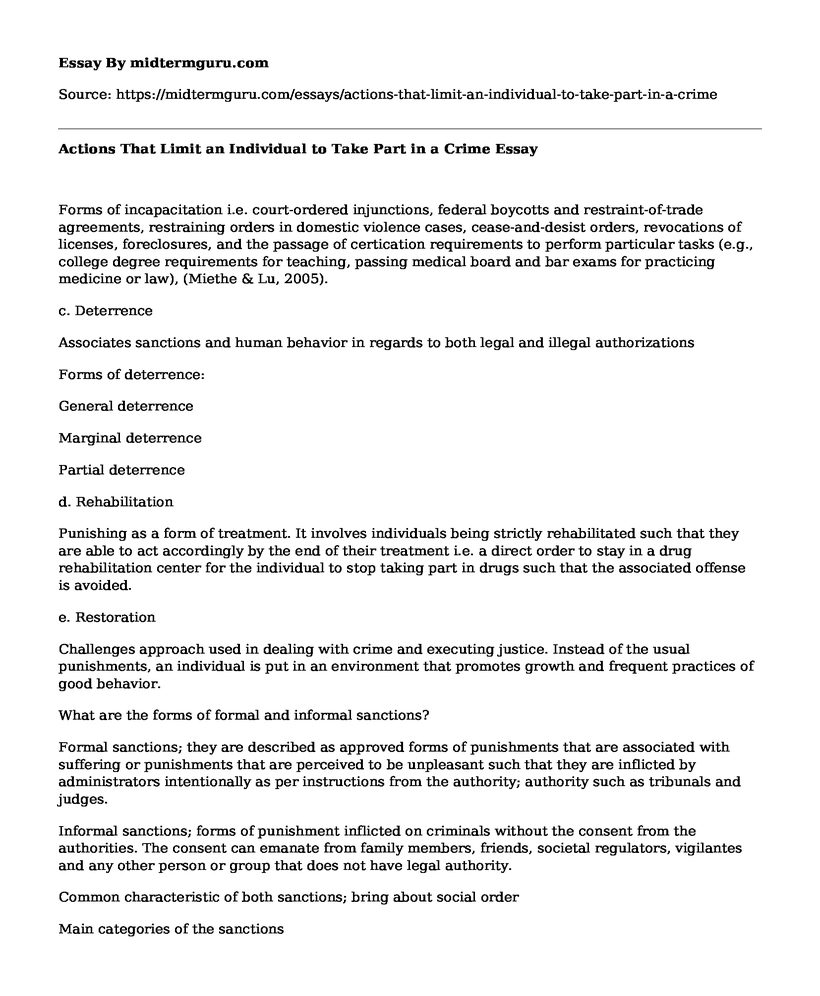Forms of incapacitation i.e. court-ordered injunctions, federal boycotts and restraint-of-trade agreements, restraining orders in domestic violence cases, cease-and-desist orders, revocations of licenses, foreclosures, and the passage of certication requirements to perform particular tasks (e.g., college degree requirements for teaching, passing medical board and bar exams for practicing medicine or law), (Miethe & Lu, 2005).
c. Deterrence
Associates sanctions and human behavior in regards to both legal and illegal authorizations
Forms of deterrence:
General deterrence
Marginal deterrence
Partial deterrence
d. Rehabilitation
Punishing as a form of treatment. It involves individuals being strictly rehabilitated such that they are able to act accordingly by the end of their treatment i.e. a direct order to stay in a drug rehabilitation center for the individual to stop taking part in drugs such that the associated offense is avoided.
e. Restoration
Challenges approach used in dealing with crime and executing justice. Instead of the usual punishments, an individual is put in an environment that promotes growth and frequent practices of good behavior.
What are the forms of formal and informal sanctions?
Formal sanctions; they are described as approved forms of punishments that are associated with suffering or punishments that are perceived to be unpleasant such that they are inflicted by administrators intentionally as per instructions from the authority; authority such as tribunals and judges.
Informal sanctions; forms of punishment inflicted on criminals without the consent from the authorities. The consent can emanate from family members, friends, societal regulators, vigilantes and any other person or group that does not have legal authority.
Common characteristic of both sanctions; bring about social order
Main categories of the sanctions
Economic sanctions; financial penalties to the criminals
The put into perspective the philosophies of restorations, deterrence and retribution, deterrence, and restoration.
List of economic sanctions:
Monetary fines/bail: covers minor criminal acts and traffic offenses
Civil suits: providing compensations and economic settlements to cover the castigatory damages
Asset forfeiture/foreclosure: seizing property
Denial of financial benefits: entails denial of access to loans and bank accounts being frozen
Injunctions/boycotts/strikes: entails halting operations as a way of demanding a right i.e. salary increase or addressing offenses being committed by administrators
License revocation entails the operating or working license being taken away or canceled such that an individual is limited in committing an offense.
Incapacitative sanctions; limit the physical chances of individuals to take part in an offense. An individual may be denied access to some areas; being denied to associated with specific people; in addition to being locked up in ones house and having guards to monitor ones movements.
List of Incapacitative sanctions:
Banishment
Pillory
Electronic anklets
Jail
Supervised probation
Grounding
Corporal punishment: inflicting suffering on the bodies of criminals intentionally. It puts into perspective the philosophies of both general and specific deterrence, retribution, forcefully getting confessions in addition to rehabilitation. It focuses on changing criminal tendencies in of individuals
List of corporal punishment
Flogging: Inflicting pain to the body by whipping it with objects such as metal rods, lashes, branches and leather straps. It is commonly used in approved schools and by parents as an adequate approach of straightening their childrens conduct. Since time in memorial, flogging is the most common form of punishment.
Branding: It entails putting letters or marks on the body of criminals to represent they type of offense theyve engaged in i.e. the letter T assigned on the body of a thief.
Mutilation: It entails the removal of body parts from a criminal as a way of forcing him or her to confess to a crime or as an order from authority to be the adequate form of punishment.
Keel hauling: An old form of punishment that involved pushing an individual, tied with ropes, on the deck of a ship and pushing them into the sea or ocean to drown to death
Dunking stools: Also an old form of punishment that involved tying an offender on a chair such that the offender was plunged into a river or any water mass
Electric shock: Involves holding an offender on an electric chair such that he or she is electrified
Raping: forceful engaging an individual in a sexual act; for the men, it refers to sodomy
Amputations: similar to mutilation and involves chopping off a body part from an individual. Mutilation may involve just making cuts on the body.
Capital punishment: The end result is always the death of the criminal. The death may either be immediate or a slow death. The most common methods include being beheaded, strangulations and also hangings.
List of capital punishments that cause instant death:
Beheading
Hanging
Strangulation
Burying alive
Drowning
Dropping from high places
Shootings
Gas chambers
Electrocutions
Lethal injections
List of capital punishments that cause slow death:
Burning
Boiling
Slicing
Crucifixion
Draw and quartering
Broken on the wheel.
Reference
Miethe, T.D., Lu, H., (2005). PUNISHMENT A Comparative Historical Perspective. New York: Cambridge University Press.
Cite this page
Actions That Limit an Individual to Take Part in a Crime . (2021, May 31). Retrieved from https://midtermguru.com/essays/actions-that-limit-an-individual-to-take-part-in-a-crime
If you are the original author of this essay and no longer wish to have it published on the midtermguru.com website, please click below to request its removal:
- Essay on Freedom Now: How People Struggle for Equal Rights
- Individual Change - Paper Example
- Why There Is a Need for Police Reforms? - Essay Sample
- Business Law: Final Contract Analysis
- Child Delinquency: Risk Factors and Protection - Essay Sample
- Drug Abuse: A Global Crisis Connected to Crime - Research Paper
- Juvenile vs Adult Courts: Comparing a Case Study - Essay Sample







